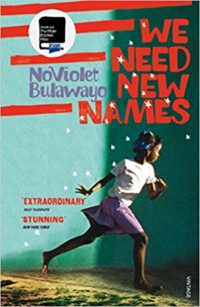Leaving because it is no longer possible to stay
 We Need New Names
We Need New Names
by NoViolet Bulawayo
This was my favourite of the six books I read over Easter weekend on the theme of refugees and migration. Perhaps it’s because it’s written from the perspective of a young girl. I know child narrators are difficult to do well, but when they are, I really respond to them.
Darling is 10 years old and lives in a shanty town called Paradise in Zimbabwe (though the country is never named, it’s clear where it is). She spends her days with her friends and lives with her mother and Mother of Bones.
At first it seems innocent, though the poverty is clearly extreme. Hints are dropped, details revealed of how far from paradise this is. Darling and her friends have their ways of dealing with unfairness and poverty and violence, but something worse is always just round the corner.
“If you’re stealing something it’s better if it’s small and hideable or something you can eat quickly and be done with, like guavas. That way, people can’t see you with the thing to be reminded that you are a shameless thief and that you stole it from them, so I don’t know what the white people were trying to do in the first place, stealing not just a tiny piece but a whole country. Who can ever forget you stole something like that?”
The reasons for the existence of the shanty town are revealed obliquely. Darling doesn’t dwell on her past. Similarly, the country’s politics are spoken of only inasmuch as they affect Darling right now, so there are campaign posters, even political violence, but it’s seen in fits and starts.
Darling’s friends are Bastard, Chipo, Godknows, Sbho and Stina. The local activists are Bornfree and Messenger. The woman who runs the bar in Paradise is MotherLove. The priest is Prophet Revelations Bitchington Mborro. The names carry a suggestion of rebirth – nicknames adopted to suit a new life – so it was surprising to learn that Darling is her given name
In some ways this is a novel of two halves, because Darling’s dream of escape comes true but of course that isn’t the end of her story. Navigating a new country poses a whole new set of problems, ones that her friends back home can’t relate to.
“Look at the children of the land leaving in droves, leaving their own land with bleeding wounds on their bodies and shock on their faces and blood in their hearts and hunger in their stomachs and grief in their footsteps…leaving because it is no longer possible to stay…knowing they will have to sit on one buttock because they must not sit comfortably lest they be asked to rise and leave, knowing they will speak in dampened whispers because they must not let their voices drown those of the owners of the land.”
I like that the novel doesn’t end with Darling’s emigration, but acknowledges the challenges that brings. Darling narrates in vernacular, which slowly changes from birth country to adopted country. From desperate gang of thieves to girly texts and magazines, Bulawayo captures the evolving language of Darling. Some terrible things happen but Darling remains a positive, lively voice.
First published 2013 by Chatto & Windus.
Source: Christmas present from my Dad.